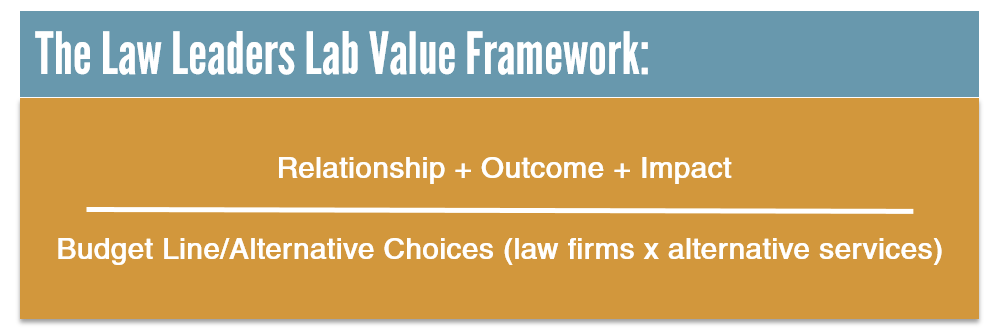by Debra Baker
In talking with General Counsel and Chief Financial Officers it is clear they are far more interested in the outcomes their lawyers deliver than the time and effort lawyers put in to producing the work. In other words, while lawyers tend to work in the world of inputs – how much time, how much complexity, how much work product – their clients think in terms of results – what is the answer, what decisions do I need to make, what information do I need to make the right decision?
Charging by the hour is a symptom of this disconnect, but the underlying problem goes beyond time-based billing alone. Those we interviewed said the price of the service, regardless of the billable rate, must be tied to the outcome delivered.
The decision makers with whom we spoke were not looking for their attorneys to guarantee results, but they do want them to recognize the business issues underlying the legal ones and to deliver services that are tied to defined business needs.
One General Counsel noted that her perspective on delivering value to clients completely changed after coming in house where she learned first-hand the connection between the work she did as a lawyer and how it was used by business team. This ability to connect the dots between the legal work and the functioning of the business is a key driver of value.
To be sure there are legal matters in which defined outcomes are not possible, but for the vast majority of legal tasks there is significant room for lawyers to deliver services and communicate in more outcome-focused ways.
One Chief Financial Officer explained that what she wants from her outside counsel is pretty straight forward – answers to questions that let her do her job quickly, accurately and with the least amount of risk exposure. Value is the attorney who makes life easier, not one who creates more work.
Using the example of a typical contract review, this CFO said her goal is to find out what if any red flags exist that she needs to address. What she received instead from one attorney was a line-by-line review with notations about potential issues next to each section, resulting in a document that was longer than the contract itself. The outcome (the work the lawyer did) may have been legally sound but it required her to invest additional time and energy in reviewing what the attorney provided so she could figure out whether and what types of decisions she still needed to make.
Contrast that against the attorney she uses today. When this attorney reviews a contract, he responds in an email with bullet points summarizing what she needs to know, allowing her to make a decision quickly and move on. The attorney most likely conducted a similar analysis as the first attorney, but he delivered the outcome she was looking for – decision points she needed to address so she could make a decision in the best interest of her organization.
In another example, a General Counsel explained that regardless of how many hours something takes or how experienced the time keeper, some legal issues are just not as valuable as others. This issue often gets discussed in the context of “bet-the-company” work vs. commodity work, but it has implications across work of all complexity.
This GC was asked, for example, to develop a BYOD (Bring Your Own Device) policy for her organization. The cost for the work delivered was far higher than what the GC expected. In isolation, she did not necessarily disagree with the number of hours worked or that the hourly rate for the attorneys experience level was out of market. But the overall price for the outcome delivered did not add up. Although the GC acknowledged she should have clarified the cost up front, the bigger issue was that the business need was not great enough to justify the price tag.
The takeaway? General Counsel and Chief Financial Officers are less concerned about an hourly rate than they are about clearly defined outcomes that can be measured against the fees charged. Lawyers should shift their thinking away from the effort they put into their work product and focus on demonstrating the benefits of what they produce.
Law Leaders Lab is committed to helping lawyer rethinking the way lawyers create, deliver and communicate value to clients. We invite you to join the conversation and engage with the law firm leaders of tomorrow at www.lawleaderslab.com
